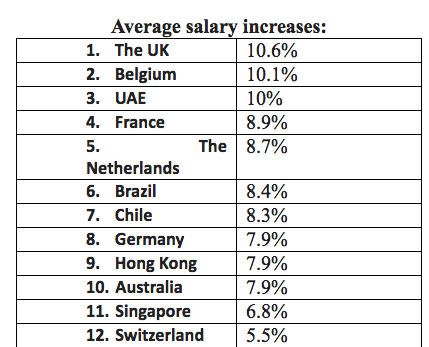How to ask for a wage rise (and get it)
There’s been plenty gloom in offices up and down the country around the cruel lack of wages growth – but you may be in line for a fat raise, shortly.
A whopping 94% of Australian managers polled plan to give one in four of their employees a wage increase of 8%, on average.
That’s according to research from recruiter Robert Half, which polled managers globally on their wages outlook.

Also read: Bitcoin Drops below $6,000 as Bitcoin Cash Surges
But the even better news is the sub 10% pay rise figure is far higher than national wage growth, which has been at a standstill – rising a paltry 1.9% per year.
The lack of salary growth that has besieged the Aussie jobs market is “about to change”, Andrew Morris, Director of Robert Half Australia, told Yahoo7 Finance.
It’s now a job seekers world and a ‘candidate-short’ market, where employers are struggling to fill jobs, he added.
There have been more and more opportunities for candidates in the last 24 months – with job seekers being offered not just one but multiple roles.
This offers more bargaining power to demand a higher salary. It is also a great opportunity for people in a job to get a salary increase, who can claim to be able to get more money elsewhere.
“People are getting 10-15% wage increase when they move to a new job,” says Morris, adding “companies are starting to counteroffer” in order to keep key staff. This is a key sign the jobs market is in good shape.
But there’s a right and wrong way to as for a salary hike, he warns.
“Tell your boss you want to discuss a salary increase and book in a meeting a few days in advance.” That way the boss has time to think about it prior to the meeting.
Also read: 3 reasons why this health stock is my top pick for November
Here are 4 tips to getting that elusive pay rise:
Know the best time to ask
Timing is everything when it comes to asking for a raise. Often a good time to broach the subject is just after your annual performance review. Sitting down with your manager and reviewing all your recent accomplishments will reinforce the value you bring to the company and help justify your request for a raise.
“Besides performance reviews, another opportune time is after finishing a big project. At these times, it can be clear to your employer that you are worth the additional pay. And never spring the topic on your boss – schedule a time to discuss the potential for a raise so he or she can be equally prepared for the conversation.”
Have solid reasons for requesting a raise
The reasons for asking for a pay raise need to go beyond purely lifestyle motivators, such as wanting more money so you can travel, buying new clothes or paying off student loans.
Going in with hard data facts and figures on why you should geta rise is also vital. Don’t get emotional – as this will always go against you. Stick to the facts – if you don’t it could damage you personal brand and reputation, Morris warns.
Know what you’re worth
Your skills and experience have value in the employment market. To find out what common salary ranges are for your position, read industry publications such as the 2017 Robert Half Salary Guide, or consult recruiters and colleagues in your field.
“Measuring your salary against industry standards will help you gauge how much extra pay you might be entitled to.”
Consider asking for benefits
Sometimes, companies may not be in a financial position to raise salaries and even after all your best attempts, your manager may still say, “We don’t have the money right now.”
“Don’t be disheartened if you receive a ‘no’ – the conversation doesn’t necessarily need to end if you have a back-up plan,” says Morris.
Consider asking for additional benefits that don’t require a budget, such as flexible working arrangements, additional annual leave or professional development opportunities.”

 Yahoo Finance
Yahoo Finance 

